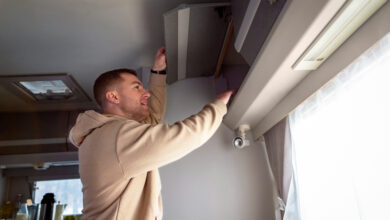How to Evaluate the Energy Efficiency of a Home as a Buyer?

For those considering a property purchase, evaluating the energy efficiency of a home is not just a smart move environmentally, but a financially wise one too. The energy efficiency of a property can impact both your utility bills and overall comfort. In this blog, provided by Estate Agents in Winchester, we will guide you through the essential steps for assessing a home’s energy efficiency before making your decision.
Check for an Energy Performance Certificate (EPC):
An (EPC) is a critical document that provides insights into a property’s energy efficiency. It grades the property from A (highly efficient) to G (low efficiency) and offers recommendations for improvements. Always request a copy of the EPC from the seller or agent to understand the current energy rating of the property and its potential for energy-saving enhancements.
Assess the Quality of Insulation:
A well-insulated home is essential for maintaining comfortable indoor temperatures and reducing energy consumption. Check the insulation quality in walls, roofs, and floors. Take note of insulation in the attic, such as fiberglass or cellulose materials. A property with good insulation tends to retain warmth in winter and remain cooler during summer.
Inspect Windows and Doors:
Windows and doors also play a significant role in a home’s energy efficiency. Look for signs of drafts or gaps around windows and doors if any. Double-glazed or triple-glazed windows provide improved insulation. Additionally, consider windows with low-emissivity (Low-E) coatings, which help regulate indoor temperatures by limiting heat from the sun.
Evaluate Heating and Cooling Systems:
The type and condition of a property’s heating and cooling systems are vital for energy efficiency. Inspect whether the property is equipped with an effective heating system, like a condensing boiler, and verify its proper maintenance. Also, explore whether the property features programmable thermostats and zoning systems that enable you to control temperatures room by room, optimizing energy use.
Look into Renewable Energy Sources:
Properties equipped with renewable energy sources like solar panels or wind turbines tend to have a lower carbon footprint and hence have reduced energy bills. These technologies harness natural resources to generate clean energy, which leads to substantial energy savings over time. Inquire about the energy output of these sources and how they can benefit your home.
Consider Energy-Efficient Appliances:
Energy-efficient appliances, including washing machines, fridges, and dishwashers, contribute to lower energy consumption. Properties with appliances displaying the Energy Star label meet stringent energy efficiency standards. Opting for energy-efficient appliances holds the potential to lead to noteworthy decreases in your overall long-term energy costs.
Research Local Incentives:
Depending on your location, there may be local incentives or grants available for energy-efficient home improvements. These incentives can help offset the cost of upgrades, making energy-efficient renovations more financially viable. Research the incentives provided in your area and explore properties that have already benefited from such enhancements.
Conclusion:
When considering a property purchase, assessing its energy efficiency is a critical step. This consideration not only aligns with environmental consciousness but also has tangible financial advantages.




